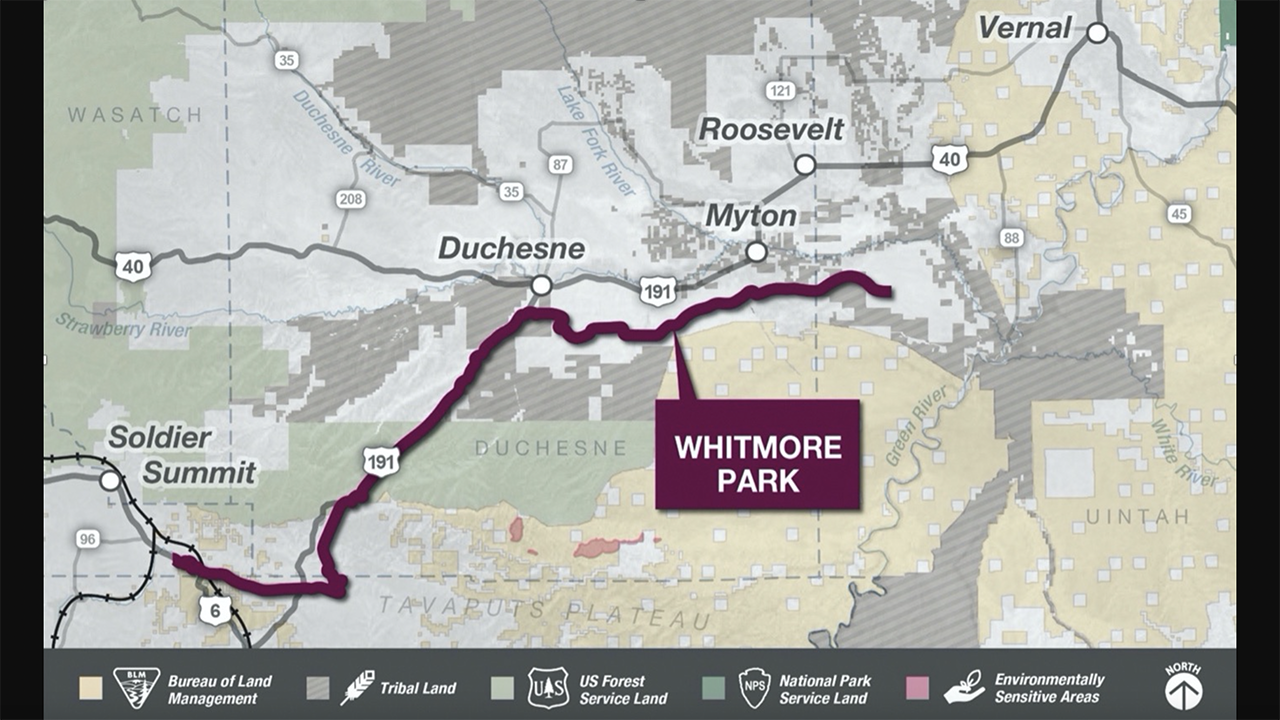
Report: Rehearing Opposed for Uinta Basin Railway Case
Written by Marybeth Luczak, Executive Editor
In August 2021, the STB Office of Environmental Analysis issued a Final EIS for the project, identifying the 88-mile Whitmore Park Alternative as the environmentally preferred route for the Uinta Basin Railway, one of three analyzed. It would extend from two terminus points in northeastern Utah’s Uinta Basin near Myton and Leland Bench to a connection with the existing Union Pacific Provo Subdivision near Kyune (see map above).
The Surface Transportation Board (STB), U.S. Fish and Wildlife Service (USFWS) and Department of Justice (DOJ) in separate filings this month told the U.S. Court of Appeals for the District of Columbia Circuit that its August ruling striking down the 2021 approval of the construction and operation of the Uinta Basin Railway “does not merit a rehearing ‘en banc’—that is, before all judges of the court, rather than a three-judge panel,” Colorado Newsline reported Nov. 13.
The 88-mile line (see map above) would be the first major freight railroad built in the U.S. in the past 30 years. Behind the project is Utah’s Seven County Infrastructure Coalition, an “independent political subdivision” of the state that sought STB approval for the line, which would primarily haul shale-extracted crude oil. The Coalition joined forces with Drexel Hamilton Infrastructure Partners to raise private capital for the build and with Rio Grande Pacific Corp. to operate and maintain the line once completed. AECOM was chosen to lead the design, and the Skanska-Clyde Joint Venture and Obayashi Corporation would help with construction.
The court’s Aug. 18, 2023 decision granted in part the consolidated petitions of Eagle County, Colo., and the Center for Biological Diversity and vacated the STB’s final exemption order as “arbitrary and capricious.” It also vacated in part STB’s Environmental Impact Statement outlining the various impacts associated with the railway’s construction and operation, and the Biological Opinion concerning the railway’s potential impacts on endangered species and critical habitats. The matter was remanded to STB for further proceedings.
According to Colorado Newsline, the Seven County Infrastructure Coalition “asked for the case to be reheard en banc,” arguing in a September filing that the “opinion issued by a panel of three circuit judges, which found that federal approval of the railway contained ‘numerous’ and ‘significant’ violations of the National Environmental Policy Act, conflicted with existing case law.”
The Denver, Colo.-based news outlet reported that “federal regulators, while noting that they disagreed with the court’s ruling, rejected those arguments and sided with the lawsuit’s plaintiffs … in opposition to a rehearing.”
“As the panel saw things, the record simply did not support the Board’s conclusion, given what it saw as the Railway’s significant environmental impacts and serious questions about the financial feasibility of the project,” Colorado Newsline reported that the DOJ and USFWS attorneys wrote in a filing. “Regardless of whether that characterization of what the record shows is correct … en banc review … is not warranted.”
According to the news outlet, the Seven County Infrastructure Coalition’s petition “will only be granted if a majority of D.C. Circuit judges agree to rehear the case. Otherwise, the panel’s ruling … will stand—pending the further possibility of a long-shot appeal to the U.S. Supreme Court.”
It’s rare that petitions for rehearing en banc are granted, Colorado Newsline reported. The coalition “argued that such a review is warranted, in part, because issues raised by the case relating to the transportation of crude oil are ‘a question of exceptional importance,’” according to the news outlet.
“‘The reasonable foreseeability of upstream and downstream environmental effects arises regularly, especially in the context of fossil fuel transportation projects,’ the coalition argued. ‘Transporting fossil fuels is and will remain controversial. Such ongoing controversy is another reason to grant en banc review.’”
![Balsa 91 transits the Fort McHenry Channel [Key Bridge Response 2024 Unified Command photo by U.S. Army Corps of Engineers Visual Information Specialist Christopher Rosario]](https://www.railwayage.com/wp-content/uploads/2024/04/Balsa91-315x168.jpg)


